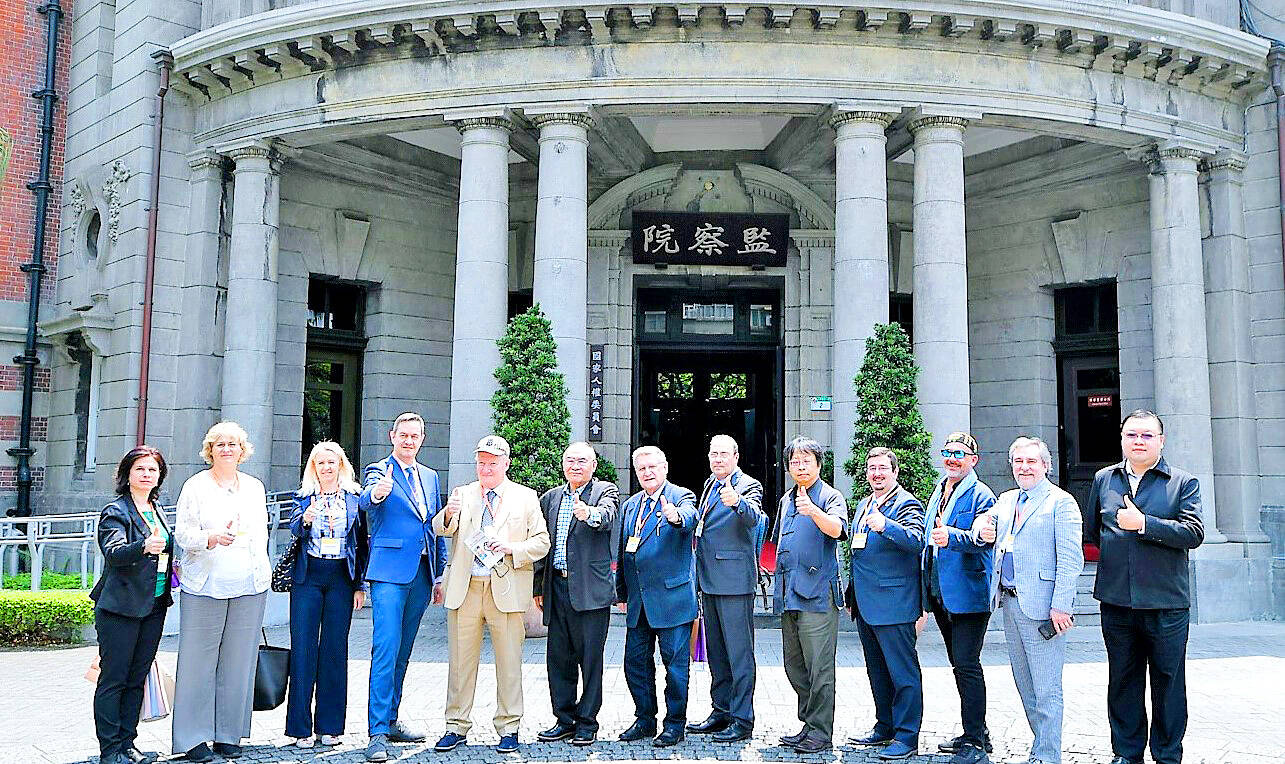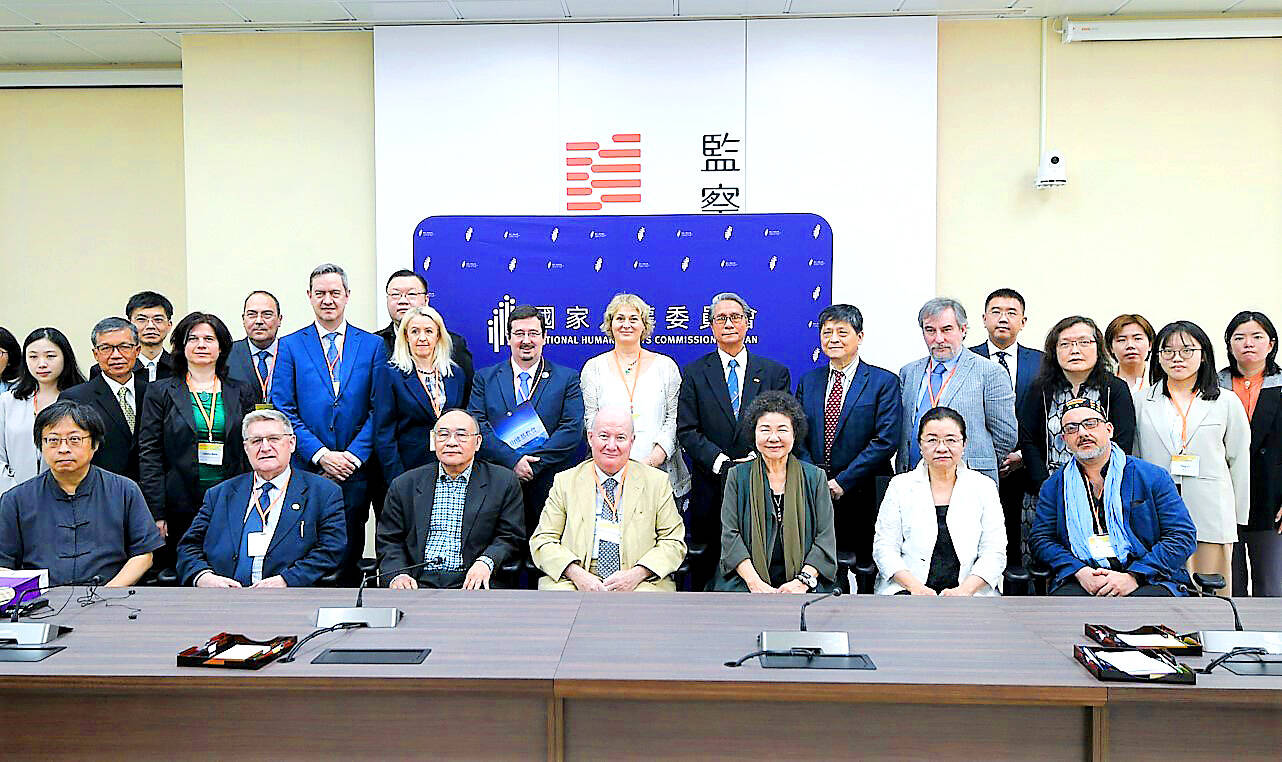In the middle of last month, an international human rights investigation group consisting of human rights academics and experts, media editors and reporters from Austria, Belgium, France, Italy, Lithuania, Spain, Romania and the US visited Taiwan and met with government agencies and human rights organizations.
The group’s final visit was to the Control Yuan’s National Human Rights Commission in Taipei, where they met with Control Yuan President Chen Chu (陳菊) and commission members Tien Chiu-chin (田秋堇) and Lai Chen-chang (賴振昌) to discuss issues related to transitional justice, post-authoritarian human rights persecution cases and the commission’s duties.
The group previously visited the National Human Rights Museum in New Taipei City — the former site of a prison in which more than 8,000 political prisoners were held and tried in military courts during the Martial Law period, including Chen.

Photo: Taipei Times
Citizen Congress Watch board member Tseng Chien-yuan (曾建元), who accompanied the group, said: “These academics have seen the prison cell in which Chen Chu was being held at the time. She was an inmate at the time, and she is now the president of the Control Yuan. In addition to admiring her courage at the time, we also believe that her experiences and abilities can prevent Taiwan from repeating her experiences, and bring progress in all aspects of Taiwan’s human rights.”
Led by Italian sociologist Massimo Introvigne, who is editor-in-chief of religious magazine Bitter Winter and a world-renowned academic, and Willy Fautre, president of the Belgium-based non-governmental group Human Rights Without Frontiers, the delegation said Taiwan’s most valuable assets are freedom, democracy and human rights.
The delegation also focused on human rights abuse cases that have not yet been fully redressed in Taiwan’s post-authoritarian era, including a case involving the previously persecuted Tai Ji Men Qigong group, which urgently requires the implementation of transitional justice and obtaining redress.

Photo: Taipei Times
The group was accompanied to the National Human Rights Commission by Ambassador-at-Large for Religious Freedom Pusin Tali, who was appointed after the administration of President Tsai Ing-wen (蔡英文) created the position.
Pusin Tali is a pastor in the Presbyterian Church and has experienced first-hand the political oppression that the church has undergone.
Upon hearing about the international attention surrounding the Tai Ji Men case, including from the delegation, he made an appeal.
“The international community is supporting Tai Ji Men. While waiting for legislative reforms, the most important thing is to allow them to use their land and academies properly,” he said. “This will help them cultivate their minds and spirits. Religion is about bringing out the good side of people. Our country should make good use of Tai Ji Men and use it as a form of international diplomacy.”
The delegation’s visit was organized by the Taiwan-based Chinese Democracy Academy Association and Citizen Congress Watch.
The organizers said they made special arrangements to help the international experts experience the democratic values of Taiwan more deeply.
“The National Human Rights Commission has been operating for two to three years, but it still lacks the power of judicial review,” Tseng said. “The power of judicial review is to provide it with a weapon, for example, temporary injunctive relief for cases where human rights are being infringed upon. It should be able to suspend the execution of illegal or inappropriate administrative penalties.”
Chen expressed her willingness to make the greatest effort possible to achieve this.
Introvigne said that through the group members’ meetings and exchanges in Taiwan over the past few days, they hoped to observe and experience the diversity and prosperity of religions in Taiwan.
While praising Taiwan’s efforts and attitude toward religious freedom, they nevertheless also had to bring up the unresolved issue of Tai Ji Men as a matter of religious freedom, Introvigne said.
“Many international scholars, including those in the United States, are concerned about this issue,” he said.
Introvigne said he believes that as a highly democratic country, Taiwan’s only way to solve such problems is through dialogue.
He emphasized that they are good friends and defenders of Taiwan and are willing to help wherever they can.

Trips for more than 100,000 international and domestic air travelers could be disrupted as China launches a military exercise around Taiwan today, Taiwan’s Civil Aviation Administration (CAA) said yesterday. The exercise could affect nearly 900 flights scheduled to enter the Taipei Flight Information Region (FIR) during the exercise window, it added. A notice issued by the Chinese Civil Aviation Administration showed there would be seven temporary zones around the Taiwan Strait which would be used for live-fire exercises, lasting from 8am to 6pm today. All aircraft are prohibited from entering during exercise, it says. Taipei FIR has 14 international air routes and

The Ministry of National Defense (MND) today released images of the military tracking China’s People's Liberation Army (PLA) movements during the latest round of Chinese drills around Taiwan. The PLA began "Justice Mission 2025" drills today, carrying out live-fire drills, simulated strikes on land and maritime targets, and exercises to blockade the nation's main ports. The exercises are to continue tomorrow, with the PLA announcing sea and air space restrictions for five zones around Taiwan for 10 hours starting from 8:30am. The ministry today released images showing a Chinese J-16 fighter jet tracked by a F-16V Block 20 jet and the

City buses in Taipei and New Taipei City, as well as the Taipei MRT, would on Saturday begin accepting QR code payments from five electronic payment providers, the Taipei Department of Transportation said yesterday. The new option would allow passengers to use the “transportation QR code” feature from EasyWallet, iPass Money, iCash Pay, Jkopay or PXPay Plus. Passengers should open their preferred electronic payment app, select the “transportation code” — not the regular payment code — unlock it, and scan the code at ticket readers or gates, General Planning Division Director-General Liu Kuo-chu (劉國著) said. People should move through the

Snow fell on Yushan (Jade Mountain, 玉山) yesterday morning as a continental cold air mass sent temperatures below freezing on Taiwan’s tallest peak, the Central Weather Administration (CWA) said. Snowflakes were seen on Yushan’s north peak from 6:28am to 6:38am, but they did not fully cover the ground and no accumulation was recorded, the CWA said. As of 7:42am, the lowest temperature recorded across Taiwan was minus-5.5°C at Yushan’s Fengkou observatory and minus-4.7°C at the Yushan observatory, CWA data showed. On Hehuanshan (合歡山) in Nantou County, a low of 1.3°C was recorded at 6:39pm, when ice pellets fell at Songsyue Lodge (松雪樓), a